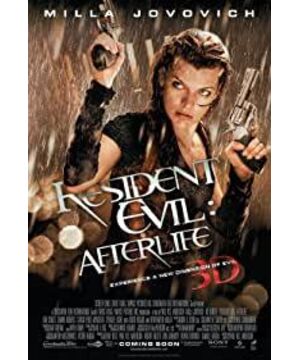Despite Hollywood's ability to produce an all-time box-office success like Tomb Raider, the movie cluster is indeed full of mediocre productions. Perhaps it is precisely because there are too many bad movies that the "Resident Evil" series has become a representative of the success of game movies. From 2002 to 2010, Resident Evil made four consecutive films, and its influence has obviously far exceeded the game fan base. It has also conquered a large number of ordinary audiences, and even won the approval of many movie fans. However, commercial success has never been able to stop critics from criticizing the series. The famous North American film critic and TV presenter Roger Ebert gave the first "Resident Evil" only one star, and made a negative evaluation from the plot, characters and visual aspects. He surprisingly gave it only half a star, calling the film a "completely pointless waste of time": "There is no reason to make it, except to make money; there is no reason to watch it, except to spend money. "So by the third and fourth part, Albert has no interest in commenting. For the latest "Afterlife", Hollywood.com's film critic said: "If there is an afterlife, I pray to God that this movie will not be shown there." This is a very interesting phenomenon, perhaps it is a collective defense made by fans who are keen on the film's own traditions against the foreign invasion of game movies.
Whether you love it or hate it, there really isn't much original in the Resident Evil series. Its success is precisely due to "transplantation" and "borrowing", taking elements from other types of films as their own. In the absence of sci-fi ideas and gimmicks, the first "Resident Evil" was not so much a sci-fi movie as a zombie movie, it was a reference to the zombies in American movies since George Romero's "Night of the Living Dead". A cultural renaissance, at the same time, the main story and action course of the film is designed to resemble a WWII military adventure movie like "Blood on the Snow Mountain". If the first Resident Evil is "Microsoft + Zombies", then the second is "Pentagon + Superheroes". Faced with the spread of the virus out of control, the Umbrella Company's handling undoubtedly refers to the actions of the United States since the 1980s and 1990s. The military approach in the film: sacrificing individuals or a small number of people to defend the interests of the powerful. It was a "superhero" who saved the plot of the movie: Emily, who was transformed by the T virus. In the third film, the director found new ideas from westerns and road films: due to the increasing number of zombies, the earth has become a desertified west, and a small group of survivors form a convoy along the road everywhere. wandering. In terms of character and action design, the Resident Evil series has reached a psychological tacit understanding with the bad taste of American B-level action movies: heavy machine guns + sexy hot beauties, violent and bloody scenes + transcendental body movements, all of which stimulate the senses of the movie While pushing to the limit, it also minimizes the narrative, character, and emotion of the film. This will undoubtedly capture some audiences, as long as bad taste is allowed in our culture. But for Roger Ebert, a high-level fan of film traditions and genre evolution, Resident Evil's crude reference to zombie films and unbridled play on bad tastes is a terrifying setback in film development.
After talking about so much "Resident Evil", we have to talk about "4" quickly. "4" is arguably the worst of the series, especially if you've only downloaded the R5 DVD from the internet and watched it on your TV. Aside from a few novel and familiar visuals—for example, those dogs with forked heads, the director was never able to find new ideas from traditional film genres to flesh out the film. The film almost completely abandons narrative, and its limit is to let time stand still—for example, the moment the plane explodes, the camera cuts to another angle to capture the actor whose body is thrown from the cabin. If you haven't seen the 3D version in theaters, you can't figure out what the director is doing if you scratch your head -- it's all an artificial pause in narrative time for the 3D visual effects. The characters and plot design of "4" are so random that it is like a child's play. At the beginning, the director let Emily be injected with immune serum to make her change from a superhero (monster?) back to a human being, but the film failed to follow up to show her this. Variety. Several action scenes in the confrontation make people feel that the director has never made an action movie, or at least he has never cared about the rules of action movies. It makes people think that this is just the prologue of the movie.
When other types of resource mining are similar, Resident Evil regards 3D as its life-saving straw. But the problem is that it directly treats 3D as cinema and technology as aesthetics. Can a movie like this go far? In the 1950s, when CinemaScope technology emerged, many Hollywood producers thought they saw the future of cinema, which was projected on a 2.66:1 super-large curved screen. Allow the audience to obtain unprecedented audio-visual enjoyment. But over time, people gradually found that this kind of film used to represent the scenery is very realistic, but it is not suitable for narrative - the audience's eyes can not bear the complex visual information in this picture. It is this flaw that made CinemaScope popular for a while and then quickly launched into the historical arena. Now, due to the unprecedented success of "Avatar", many Hollywood directors have seen the future of movies in 3D again, and they want to have something to do with 3D in any movie they make. Its extreme situation is the emergence of a movie like "Resident Evil 4" that completely abandons narrative, characters, and emotions, and goes directly to 3D for 3D. Whether 3D represents the future of movies is still being explored, but movies that do not have narration, no characterization, and can not evoke emotions will definitely not go far. This has been proven by history.
View more about Resident Evil: Afterlife reviews











